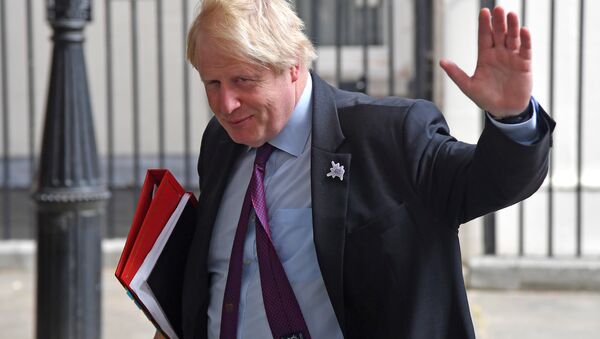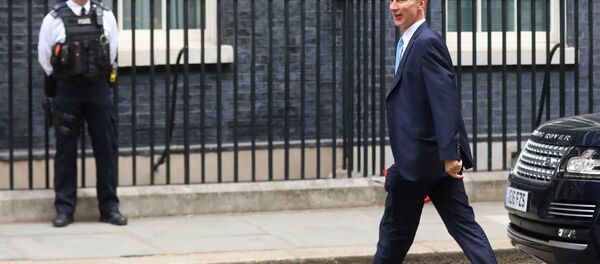The Conservative party must unite or face the risk of Jeremy Corbyn gaining power. This is what the UK Prime Minister told conservative MPs following two key Cabinet resignations. On Monday, Boris Johnson announced his departure from the post of UK Foreign Secretary hours after David Davis stepped down as Secretary for Brexit. Jeremy Hunt left his role as health minister to step in as the new Foreign Secretary, while Davis' post was handed over to Dominic Raab.
Sputnik: How expected was Boris Johnson’s departure for you personally?
Mark Garnett: Mr. Johnson’s removal from the Cabinet has been a good thing for Mrs. May. He’s also been replaced by Jeremy Hunt who I think Mrs. May can trust to be really quite a loyal colleague and so she’s really gained a useful Foreign Secretary and lost one who was quite a danger to her. So again, there’s another reason, I think at the moment you would have to say that she’s stronger.
Mark Garnett: Obviously at the moment there’re issues which would make life a bit difficult for any Foreign Secretary. But I think that if we can emerge from this period then Mr. Hunt, I think, would be certainly a lot more promising than Mr. Johnson. The thing about Mr. Hunt is that he isn’t free from controversy and he’s held an extremely difficult job as a Health Secretary, before that he was Culture Secretary and that was difficult, although he was more junior. I think that Mr. Hunt could be seen as somebody who’s more diplomatic than Mr. Johnson and would also be much more anxious to listen to advice from officials. And so we’re hoping the relations with a number of different countries can be set on a more considered basis, in other words there’s something that actually reflects a bit of careful preparation and thinking, rather than Mr. Johnson who generally wanted to play to the cameras whatever he was saying. I think that we can look forward to a position where relations are generally going to be more constructive if they can be. I think Mr. Hunt is somebody who wants to reach some kind of compromise, he’s not a confrontational person and therefore again I think that the British government although people might say Mr. Hunt perhaps isn’t quite of a quality one needs in a Foreign Secretary that he’s not a star and particularly he’s not somebody you would single out as some kind of a brilliant politician but he is I think at least safe.
Mark Garnett: Quite, but I think that the chances of a general election have receded a little bit because Mrs. May is able to keep her troops in line partly by saying if you get rid of me there’ll be an election and Mr. Corbyn, his Labour Party, has edged very narrowly ahead in the most recent opinion poll, which is in itself very astonishing, because they should be miles ahead. And that shows that Labour Party itself isn’t really in a position to fight a general election. Mr. Corbyn can say if he did Prime Ministers after Mrs. May’s statement on the EU negotiations Mr. Corbyn sounded as if he was ready for the battle and ready to take over power. But what he’s hoping for is that after the deal is finally reached or something happens with the EU, then that would be the time when he can capitalize on the problems of this government that if he was given the job as negotiating with the EU there’s no reason for anyone to think he would do any better than Mrs. May. Because his party is divided and he himself is divided, his instincts are all with Brexit and really it’s only been by a painful process that he’s realized that perhaps some kind of a more pragmatic deal is necessary and that even if we do leave the EU we should stay in the single market and the currency union. Those are things which he had to learn against his instincts. For all those reasons I think that the public might like the idea of a general election. Equally I think that they’re rather sick of politics generally and they’re really sick of Brexit. What they really want is politicians to get on with it and they don’t really understand why this process is taking so long and certainly very few people understand the details of the situation as it now stands. I think that the British public is now even more bitterly divided than it was at the time of the referendum.
The views and opinions expressed in this article are those of the speaker and do not necessarily reflect those of Sputnik.






